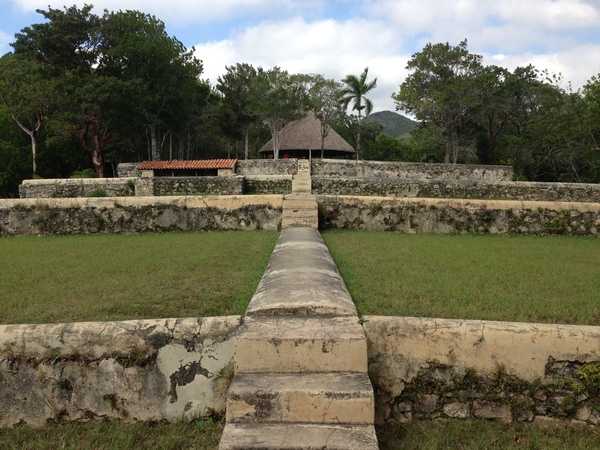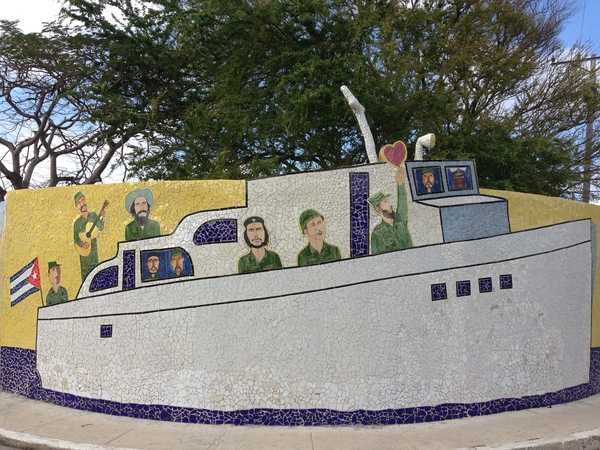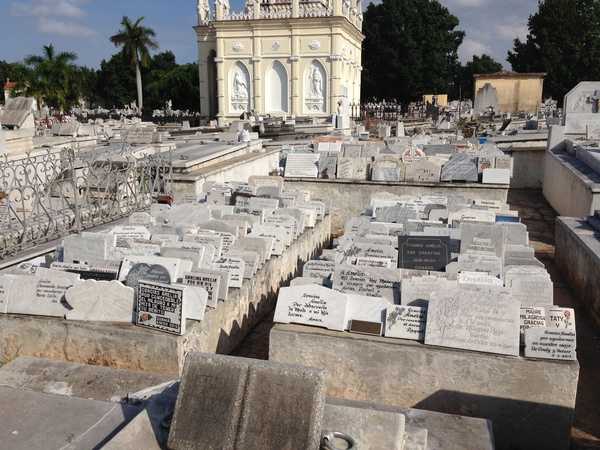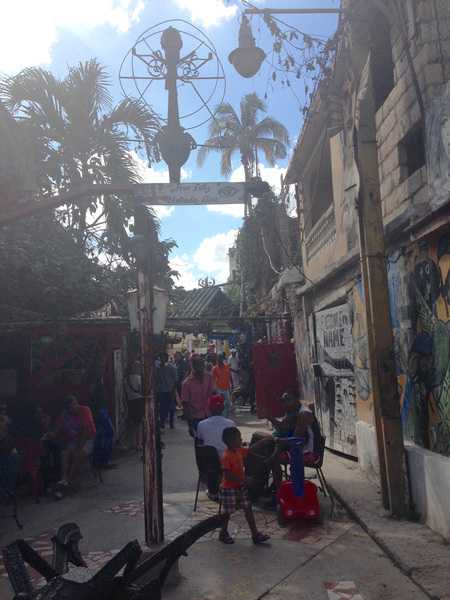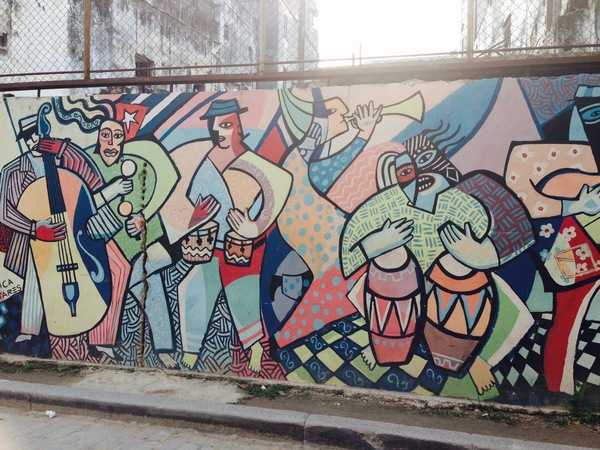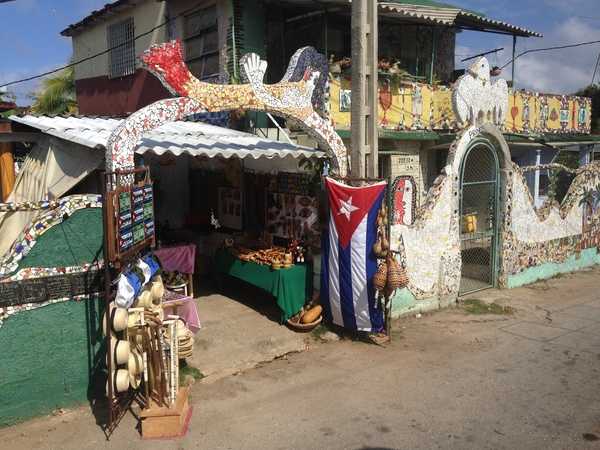Cuba - CU - CUB - CUB - Central America and the Caribbean
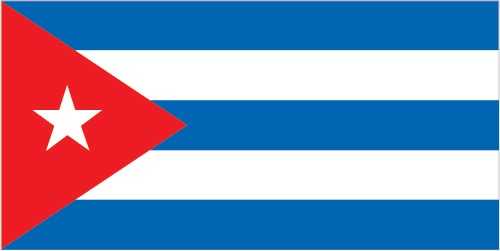
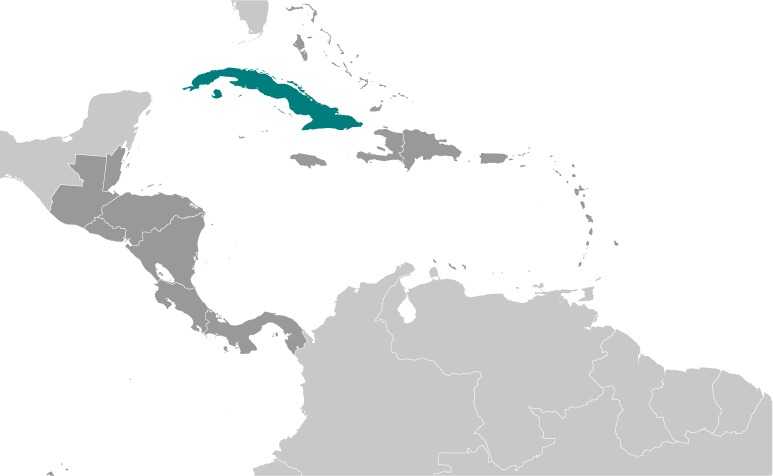
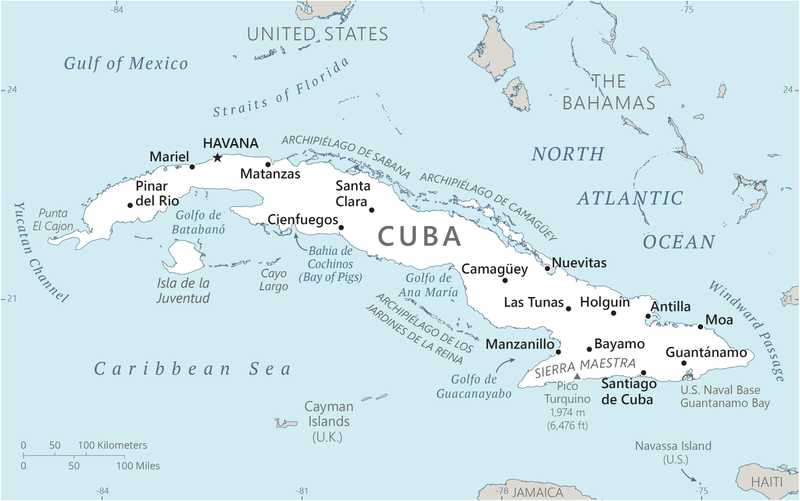
Cuba Images
Cuba Factbook Data
Diplomatic representation from the US
embassy: Calzada between L & M Streets, Vedado, Havana
mailing address: 3200 Havana Place, Washington DC 20521-3200
telephone: [53] (7) 839-4100
FAX: [53] (7) 839-4247
email address and website:
acshavana@state.gov
https://cu.usembassy.gov/
Age structure
15-64 years: 66.5% (male 3,670,531/female 3,623,658)
65 years and over: 17.2% (2024 est.) (male 852,910/female 1,034,295)
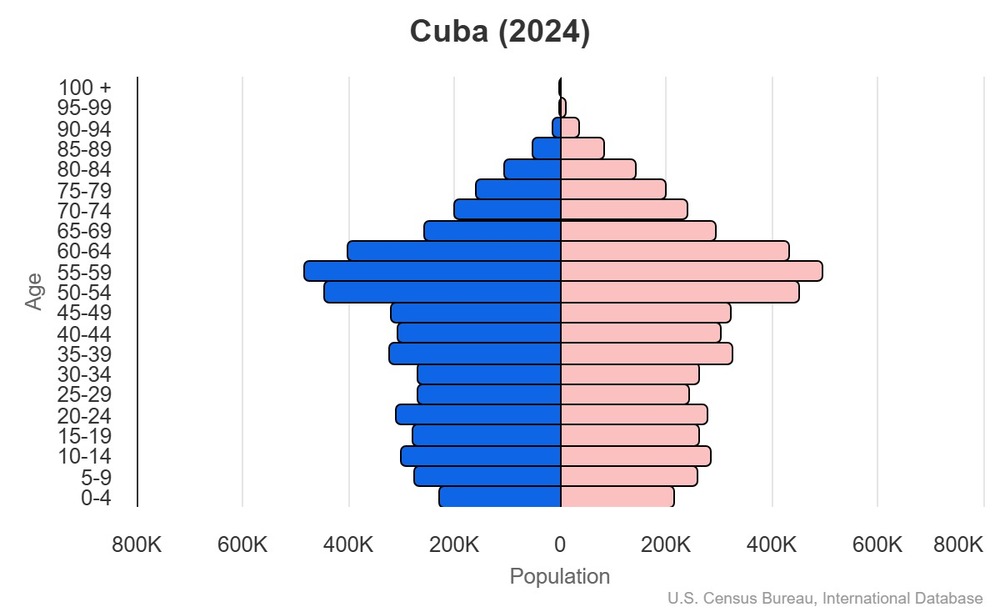
For additional information, please see the entry for Population pyramid on the Definitions and Notes page.
Geographic coordinates
Sex ratio
0-14 years: 1.06 male(s)/female
15-64 years: 1.01 male(s)/female
65 years and over: 0.82 male(s)/female
total population: 0.99 male(s)/female (2024 est.)
Natural hazards
People - note
Area - comparative
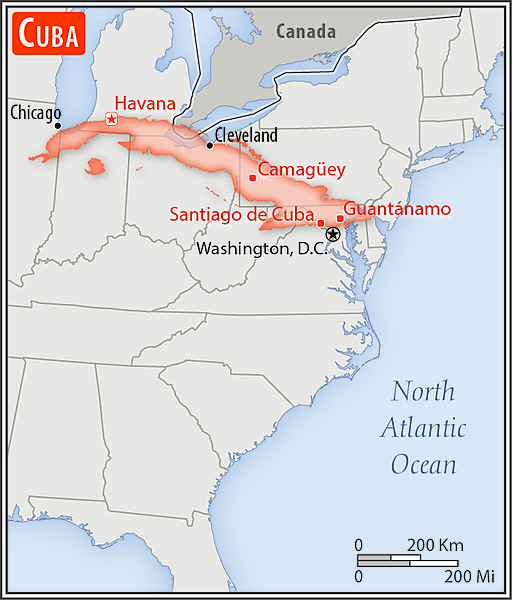
slightly smaller than Pennsylvania
Military service age and obligation
Background
Cuba then experienced a string of governments mostly dominated by the military and corrupt politicians. Fidel CASTRO led a rebel army to victory in 1959; his authoritarian rule held the subsequent regime together for nearly five decades. He handed off the presidency to his younger brother Raul CASTRO in 2008. Cuba's communist revolution, with Soviet support, was exported throughout Latin America and Africa during the 1960s, 1970s, and 1980s. Miguel DIAZ-CANEL Bermudez, hand-picked by Raul CASTRO to succeed him, was approved as president by the National Assembly and took office in 2018. DIAZ-CANEL was appointed First Secretary of the Communist Party in 2021 after the retirement of Raul CASTRO and continues to serve as both president and first secretary.
Cuba traditionally and consistently portrays the US embargo, in place since 1961, as the source of its socioeconomic difficulties. As a result of efforts begun in 2014 to reestablish diplomatic relations, the US and Cuba reopened embassies in their respective countries in 2015. The embargo remains in place, however, and the relationship between the US and Cuba remains tense. Illicit migration of Cuban nationals to the US via maritime and overland routes has been a longstanding challenge. In 2017, the US and Cuba signed a Joint Statement ending the so-called "wet-foot, dry-foot" policy, by which Cuban nationals who reached US soil were permitted to stay. Irregular Cuban maritime migration has dropped significantly since 2016, when migrant interdictions at sea topped 5,000, but land border crossings continue.
Environmental issues
International environmental agreements
signed, but not ratified: Marine Life Conservation
Military expenditures
3.2% of GDP (2019 est.)
2.9% of GDP (2018 est.)
2.9% of GDP (2017 est.)
3.1% of GDP (2016 est.)
Exports - commodities
note: top five export commodities based on value in dollars
Exports - partners
note: top five export partners based on percentage share of exports
Administrative divisions
Agricultural products
note: top ten agricultural products based on tonnage
Military and security forces
Paramilitary forces under the FAR: Youth Labor Army (Ejercito Juvenil del Trabajo, EJT), Territorial Militia Troops (Milicia de Tropas de Territoriales, MTT), Defense and Production Brigades (Brigadas de Producción y Defensa, BPD), Civil Defense Organization (Defensa Civil de Cuba)
Ministry of Interior: National Revolutionary Police (Policía Nacional Revolucionaria, PNR), Directorate of Border Guard Troops (Dirección de Tropas de Guardia Fronteriza, TGF), Department of State Security (Departamento de Seguridad del Estado, DSE) (2025)
Budget
expenditures: $64.64 billion (2017 est.)
Capital
geographic coordinates: 23 07 N, 82 21 W
time difference: UTC-5 (same time as Washington, DC, during Standard Time)
daylight saving time: +1hr, begins second Sunday in March; ends first Sunday in November; note - Cuba has been known to alter the schedule of DST on short notice in an attempt to conserve electricity for lighting
etymology: Spanish soldier Diego VELAZQUEZ named the city San Cristobal de la Habana, or Saint Christopher of the Habana; "Habana" may have been the name of a local ethnic group, but the meaning of the word is unknown
Imports - commodities
note: top five import commodities based on value in dollars
Climate
Coastline
Constitution
amendment process: proposed by the National Assembly of People’s Power; passage requires approval of at least two-thirds majority of the National Assembly membership; amendments to constitutional articles on the authorities of the National Assembly, Council of State, or any rights and duties in the constitution also require approval in a referendum; constitutional articles on the Cuban political, social, and economic system cannot be amended
Exchange rates
Exchange rates:
24 (2024 est.)
24 (2023 est.)
24 (2022 est.)
24 (2021 est.)
1 (2020 est.)
note: official exchange rate of 24 Cuban pesos per US dollar effective 1 January 2021
Executive branch
head of government: Prime Minister Manuel MARRERO Cruz (since 21 December 2019)
cabinet: Council of Ministers proposed by the president and appointed by the National Assembly
election/appointment process: president and vice president indirectly elected by the National Assembly for a 5-year term (eligible for a second term)
most recent election date: 19 April 2023
election results:
2023: Miguel DIAZ-CANEL Bermudez (PCC) reelected president; percent of National Assembly vote - 97.7%; Salvador Antonio VALDES Mesa (PCC) reelected vice president; percent of National Assembly vote - 93.4%
2018: Miguel DIAZ-CANEL Bermudez (PCC) elected president; percent of National Assembly vote - 98.8%; Salvador Antonio VALDES Mesa (PCC) elected vice president; percent of National Assembly vote - 98.1%
expected date of next election: 2028
Flag
meaning: the blue bands stand for the islands' three former departments: Central, Occidental, and Oriental; the white bands for the purity of the independence ideal; the triangle for liberty, equality, and fraternity; the red color for the blood shed in the independence struggle; the white star, called "La Estrella Solitaria" (the Lone Star), lights the way to freedom and was inspired by the state flag of Texas
note: design similar to the Puerto Rican flag, with the colors of the bands and triangle reversed
Independence
Industries
Judicial branch
judge selection and term of office: professional judges elected by the National Assembly are not subject to a specific term; lay judges nominated by workplace collectives and neighborhood associations and elected by municipal or provincial assemblies; lay judges appointed for 5-year terms and serve up to 30 days per year
subordinate courts: People's Provincial Courts; People's Regional Courts; People's Courts
Land boundaries
border countries (1): US Naval Base at Guantanamo Bay 28.5 km
note: Guantanamo Naval Base is leased by the US and remains part of Cuba
Land use
arable land: 28% (2023 est.)
permanent crops: 6.3% (2023 est.)
permanent pasture: 27.4% (2023 est.)
forest: 34.9% (2023 est.)
other: 3.5% (2023 est.)
Legal system
Legislative branch
legislative structure: unicameral
number of seats: 470 (all directly elected)
electoral system: other systems
scope of elections: full renewal
term in office: 5 years
most recent election date: 3/26/2023
percentage of women in chamber: 55.7%
expected date of next election: March 2028
note: the National Candidature Commission submits a slate of approved candidates; to be elected, candidates must receive more than 50% of valid votes, otherwise the seat remains vacant or the Council of State can declare another election
Literacy
male: 99% (2019 est.)
female: 96.3% (2019 est.)
Maritime claims
contiguous zone: 24 nm
exclusive economic zone: 200 nm
International organization participation
National holiday
Nationality
adjective: Cuban
Natural resources
Geography - note
Economic overview
Political parties
Railways
standard gauge: 8,195 km (2017) 1.435-m gauge (124 km electrified)
narrow gauge: 172 km (2017) 1.000-m gauge
note: As of 2013, 70 km of standard gauge and 12 km of narrow gauge track were not for public use
Suffrage
Terrain
Government type
Country name
conventional short form: Cuba
local long form: República de Cuba
local short form: Cuba
etymology: the origin of the name is disputed; it could be derived from a local Taino word, either cubao, meaning "where fertile land is abundant," or coabana, meaning "great place"
Location
Map references
Irrigated land
Diplomatic representation in the US
chancery: 2630 16th Street NW, Washington, DC 20009
telephone: [1] (202) 797-8515
FAX: [1] (202) 797-8521
email address and website:
recepcion@usadc.embacuba.cu
https://misiones.cubaminrex.cu/en/usa/embassy-cuba-usa
Internet users
note: private citizens are prohibited from buying computers or accessing the Internet without special authorization; foreigners may access the Internet in large hotels but are subject to firewalls; some Cubans buy illegal passwords on the black market or take advantage of public outlets to access limited email and the government-controlled "intranet"; issues relating to COVID-19 impact research into internet adoption, so actual internet user figures may be different than published numbers suggest
Internet country code
GDP (official exchange rate)
note: data in current dollars at official exchange rate
Trafficking in persons
Total renewable water resources
School life expectancy (primary to tertiary education)
male: 13 years (2023 est.)
female: 15 years (2023 est.)
Urbanization
rate of urbanization: 0.19% annual rate of change (2020-25 est.)
Broadcast media
Drinking water source
urban: 95.5% of population (2022 est.)
rural: 91.8% of population (2022 est.)
total: 94.7% of population (2022 est.)
unimproved:
urban: 4.5% of population (2022 est.)
rural: 8.2% of population (2022 est.)
total: 5.3% of population (2022 est.)
National anthem(s)
lyrics/music: Pedro FIGUEREDO
history: adopted 1940; Pedro FIGUEREDO first performed it in 1868 during the Ten Years War against the Spanish; a leading figure in the uprising, FIGUEREDO was captured in 1870 and executed by a firing squad; just before being shot, he is said to have shouted, "Morir por la Patria es vivir" (To die for the country is to live), a line from the anthem
Major urban areas - population
International law organization participation
Physician density
Hospital bed density
National symbol(s)
GDP - composition, by end use
government consumption: 25.5% (2023 est.)
investment in fixed capital: 12.3% (2023 est.)
investment in inventories: 10% (2023 est.)
exports of goods and services: 43.5% (2023 est.)
imports of goods and services: -64.6% (2023 est.)
note: figures may not total 100% due to rounding or gaps in data collection
Citizenship
citizenship by descent only: yes
dual citizenship recognized: no
residency requirement for naturalization: unknown
Population distribution
Electricity access
Civil aircraft registration country code prefix
Sanitation facility access
urban: 98.4% of population (2022 est.)
rural: 95.7% of population (2022 est.)
total: 97.8% of population (2022 est.)
unimproved:
urban: 1.6% of population (2022 est.)
rural: 4.3% of population (2022 est.)
total: 2.2% of population (2022 est.)
Ethnic groups
note: data represent racial self-identification from Cuba's 2012 national census
Religions
note: folk religions include religions of African origin, spiritualism, and others intermingled with Catholicism or Protestantism; data is estimative because no authoritative source on religious affiliation exists for Cuba
Languages
major-language sample(s):
La Libreta Informativa del Mundo, la fuente indispensable de información básica. (Spanish)
The World Factbook, the indispensable source for basic information.
Imports - partners
note: top five import partners based on percentage share of imports
Refugees and internally displaced persons
IDPs: 37,171 (2024 est.)
Elevation
lowest point: Caribbean Sea 0 m
mean elevation: 108 m
Health expenditure
21% of national budget (2022 est.)
Military and security service personnel strengths
Military equipment inventories and acquisitions
Total water withdrawal
industrial: 740 million cubic meters (2022 est.)
agricultural: 4.519 billion cubic meters (2022 est.)
Waste and recycling
percent of municipal solid waste recycled: 25.7% (2022 est.)
National heritage
selected World Heritage Site locales: Old Havana (c); Trinidad and the Valley de los Ingenios (c); San Pedro de la Roca Castle (c); Desembarco del Granma National Park (n); Viñales Valley (c); Archaeological Landscape of the First Coffee Plantations (c); Alejandro de Humboldt National Park (n); Historic Cienfuegos (c); Historic Camagüey (c)
Child marriage
women married by age 18: 29.4% (2019)
men married by age 18: 5.9% (2019)
Coal
exports: 25 metric tons (2023 est.)
imports: 8,000 metric tons (2023 est.)
Electricity generation sources
solar: 1.4% of total installed capacity (2023 est.)
wind: 0.4% of total installed capacity (2023 est.)
hydroelectricity: 0.8% of total installed capacity (2023 est.)
biomass and waste: 2.2% of total installed capacity (2023 est.)
Natural gas
consumption: 850.133 million cubic meters (2023 est.)
proven reserves: 70.792 billion cubic meters (2021 est.)
Petroleum
refined petroleum consumption: 118,000 bbl/day (2023 est.)
crude oil estimated reserves: 124 million barrels (2021 est.)
Gross reproduction rate
Currently married women (ages 15-49)
Ports
large: 6
medium: 3
small: 10
very small: 6
size unknown: 9
ports with oil terminals: 14
key ports: Antilla, Bahai de la Habana, Bahia de Sagua de Tanamo, Cabanas, Casilda, Cienfuegos, Nuevitas Bay, Puerto Guantanamo, Santiago de Cuba
National color(s)
Particulate matter emissions
Methane emissions
agriculture: 249.7 kt (2019-2021 est.)
waste: 146.4 kt (2019-2021 est.)
other: 2.2 kt (2019-2021 est.)
Labor force
note: number of people ages 15 or older who are employed or seeking work
Youth unemployment rate (ages 15-24)
male: 4.1% (2024 est.)
female: 3.5% (2024 est.)
note: % of labor force ages 15-24 seeking employment
Net migration rate
Median age
male: 41 years
female: 44.4 years
Maternal mortality ratio
Total fertility rate
Unemployment rate
1.8% (2023 est.)
1.9% (2022 est.)
note: % of labor force seeking employment
Carbon dioxide emissions
from coal and metallurgical coke: 16,000 metric tonnes of CO2 (2023 est.)
from petroleum and other liquids: 18.12 million metric tonnes of CO2 (2023 est.)
from consumed natural gas: 1.58 million metric tonnes of CO2 (2023 est.)
Area
land: 109,820 sq km
water: 1,040 sq km
Real GDP (purchasing power parity)
$81.985 billion (2023 est.)
$83.597 billion (2022 est.)
note: data in 2015 dollars
Airports
Infant mortality rate
male: 4.5 deaths/1,000 live births
female: 3.5 deaths/1,000 live births
Inflation rate (consumer prices)
151.9% (2021 est.)
11.9% (2020 est.)
note: annual % change based on consumer prices
Real GDP per capita
$18,300 (2023 est.)
$13,300 (2022 est.)
note: data in 2015 dollars
Broadband - fixed subscriptions
subscriptions per 100 inhabitants: 3 (2023 est.)
Tobacco use
male: 24.7% (2025 est.)
female: 9% (2025 est.)
Obesity - adult prevalence rate
Energy consumption per capita
Death rate
Birth rate
Electricity
consumption: 11.951 billion kWh (2023 est.)
transmission/distribution losses: 3.352 billion kWh (2023 est.)
Merchant marine
by type: general cargo 13, oil tanker 10, other 42
Children under the age of 5 years underweight
Imports
$10.971 billion (2019 est.)
$12.567 billion (2018 est.)
note: GDP expenditure basis - imports of goods and services in current dollars
Exports
$12.632 billion (2019 est.)
$14.53 billion (2018 est.)
note: GDP expenditure basis - exports of goods and services in current dollars
Heliports
Alcohol consumption per capita
beer: 1.77 liters of pure alcohol (2019 est.)
wine: 0.23 liters of pure alcohol (2019 est.)
spirits: 2.69 liters of pure alcohol (2019 est.)
other alcohols: 0.01 liters of pure alcohol (2019 est.)
Life expectancy at birth
male: 77.8 years
female: 82.6 years
Real GDP growth rate
1.8% (2022 est.)
1.3% (2021 est.)
note: annual GDP % growth based on constant local currency
Industrial production growth rate
note: annual % change in industrial value added based on constant local currency
GDP - composition, by sector of origin
industry: 27.5% (2023 est.)
services: 70% (2023 est.)
note: figures may not total 100% due to non-allocated consumption not captured in sector-reported data
Education expenditure
17% national budget (2022 est.)
Population growth rate
Military - note
Dependency ratios
youth dependency ratio: 22.6 (2025 est.)
elderly dependency ratio: 27.6 (2025 est.)
potential support ratio: 3.6 (2025 est.)
Population
male: 4,950,615
female: 5,108,904
Telephones - mobile cellular
subscriptions per 100 inhabitants: 73 (2024 est.)
Telephones - fixed lines
subscriptions per 100 inhabitants: 15 (2024 est.)
